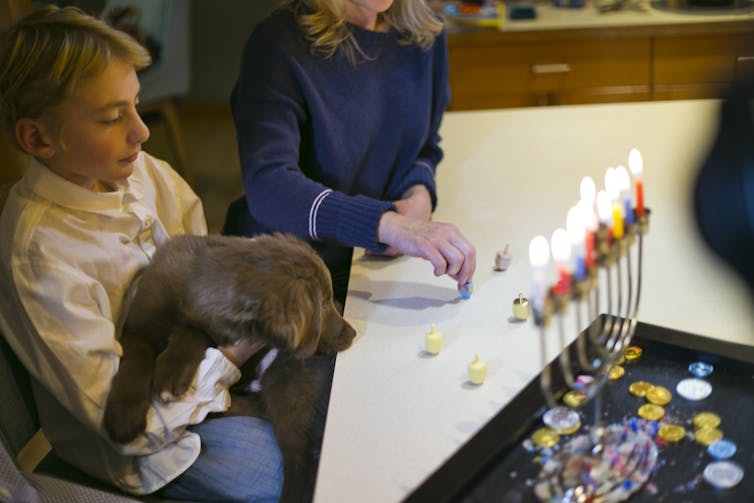New Year's leftovers can be toxic to dogs and cats. Here's what to do if your pet eats it
During the holidays we like to indulge ourselves with foods we don’t usually eat. As a pet owner myself, I know people want to give treats to their four-legged friend too.
As a veterinarian and veterinary researcher, however, I know that very common foods, some of which are very popular around the holidays, are dangerous for pets.
Here are some food-induced problems vets routinely encounter during holiday emergencies and what to do if they occur.
The fat
Turkey in gravy is probably one of the most popular holiday meals. And most dogs and cats would agree with their humans that roast turkey is a delicious meal.
However, the fat found in turkey skin and the fatty foods that may accompany it, such as gravy, butter or bacon, are not suitable for cats and dogs. Pets that eat too much fat can develop pancreatitis, an inflammation of the pancreas, the organ that helps break down fats, proteins and carbohydrates.
Pancreatitis causes digestive enzymes to leak from the pancreas, which eventually “digests” itself. If left untreated, this inflammation can affect other organs, such as the kidneys and liver, and even cause blood clots to form.
The most common symptoms of pancreatitis are vomiting and diarrhea. A pet that appears to be suffering from pancreatitis should be taken quickly to the nearest veterinary hospital or veterinary emergency room. Blood tests will be done there, including a specific test for pancreatic enzymes called pancreatic lipase immunoreactivity, or ILP.
Treatment of this inflammation mainly consists of treating the symptoms. The animal is given intravenous fluids to help restore electrolyte balance, as well as nausea and pain relievers to stop vomiting. You may need antibiotics, liver protectants and probiotics, as well as a special diet.
Onions, no, and bread, it’s average
If turkey was the only problem! Many other foods that people like to eat during the holidays can be harmful to pets.
Several allium species used for holiday cooking, such as leeks, garlic, onions, chives, and shallots, are good for human health. For dogs and cats, however, they are toxic. If animals consume it, they can develop hemolytic anemia, a drop in the number of red blood cells. The symptoms of the disease, which generally appear a few days after ingestion of food, are as follows: vomiting, diarrhea, lethargy and jaundice.
To treat hemolytic anemia, vets do blood tests to determine if a transfusion is needed. They treat the symptoms of allium poisoning with IV solution, antioxidants, and anti-nausea medications.
Leavened foods, such as some types of bread, are also part of holiday meals. It’s important to keep them out of your pet’s reach. Yeast can ferment in the stomach and produce toxic levels of ethanol. Ethanol toxicity can cause metabolic acidosis in animals and cause a sudden drop in blood sugar, respiratory depression, seizures, and cardiac arrest.
Typically, pet owners suspect metabolic acidosis when it’s almost too late because it has few obvious symptoms. Therefore, if there is a possibility that an animal has ingested any type of cooked or raw yeast paste, they should be taken to a veterinary emergency department immediately.
Pets can also become intoxicated with ethanol from licking cocktails or beer, so keep all alcoholic beverages away from them.
No chocolate!
But what about the holiday gift everyone loves to give, chocolate?
The substances that make humans crave chocolate — methylxanthines such as theobromine and caffeine — are toxic to dogs and cats. When vets provide emergency care for chocolate ingestion, it’s often because children have shared their treat with their beloved pet.

Nathan Bilow/Photodisc via Getty Images
Pets who swallow chocolate can get “chocolate poisoning” because methylxanthines build up in their bodies and make them sick. Symptoms of chocolate poisoning include tremors, rapid heartbeat, vomiting, diarrhea, restlessness, and even seizures.
This poisoning is a medical emergency. The animal’s stomach must be emptied and treated with an infusion and activated charcoal. Your vet will want to know the type of chocolate and how much your pet has ingested, as some chocolates, such as dark chocolate, can have more serious toxic effects.
Chocolate also contains a lot of fat, which the pancreas of the cat or dog will not like.
Grapes and dogs don’t get along
And the fruit? There is a very toxic fruit for dogs that often appears on holiday menus: grapes, both fresh and dehydrated in the form of raisins.
The tartaric acid present in grapes can cause acute kidney disease. Signs of kidney failure in a dog are vomiting, intermittent diarrhea and increased water intake.
Acute kidney failure in dogs is a medical emergency. If suspected, the animal should be rushed to a veterinary hospital. Treatment is usually limited to stabilization with an intravenous solution.
A sweet poison
While xylitol poisoning is one of the most common emergencies faced by veterinarians, it is little known to pet owners.
Xylitol is an artificial sweetener often used in sugar-free products. While safe for humans, it is a fast-acting and potentially fatal poison for cats and dogs.
Ingesting even a small amount of xylitol can lead to a rapid release of insulin from the animal’s liver, causing hypoglycemia, i.e., abnormally low blood glucose levels. Within 30 minutes symptoms such as vomiting, lethargy and convulsions and loss of coordination of the limbs (ataxia) appear.
Emergency treatment of an animal poisoned with xylitol consists of administering a dextrose solution intravenously to raise blood sugar and closely monitor the evolution of its condition.
Conclusion ? Many foods that are delicious and safe for humans can be very dangerous for all pets, not just cats and dogs, but also birds, reptiles, and small creatures like mice, hamsters, and gerbils. To make the holidays wonderful for your furry or feathered friends, give them treats purchased from the pet store or vet and keep them off the kitchen counter and trash can.


Commentaires
Enregistrer un commentaire